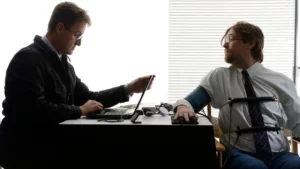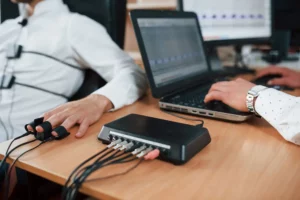The use of polygraphs in Israeli legal proceedings dates back to the 1960s. At that time, the Israeli government was looking for new and innovative ways to improve national security, and polygraphs were seen as a potentially useful tool for identifying and preventing harm.
In 1966, the Israeli Security Agency (ISA) began using polygraphs in their interrogations of suspected criminals. Initially, the results of these tests were not admissible in court, but they were used to gather information and build cases against suspects.

Over time, the use of polygraphs in Israeli courts has evolved. In 1995, the Israeli Supreme Court ruled that polygraph results could be admitted as evidence in criminal cases, but only under certain conditions. Specifically, the court required that the polygraph examiner be qualified, that the test be conducted in a controlled environment, and that the results be corroborated by other evidence.
Despite this ruling, the use of polygraphs in Israeli courts remains controversial. Some argue that polygraphs are not reliable enough to be used as evidence, while others believe that they can be a useful tool in certain circumstances.
A brief overview of the Israeli legal system
Israel has a legal system based on a combination of common law and civil law principles. The country’s legal framework is based on a series of laws passed by the Knesset (Israel’s parliament) and interpreted by the country’s court system.
The Israeli court system is made up of three levels: the magistrate’s court, the district court, and the supreme court. The Magistrate’s Court has jurisdiction over minor civil and criminal cases, while the District Court hears more serious ones. The Supreme Court is the highest court in Israel and has the power to hear appeals from lower courts.
In Israel, criminal trials are held in front of a panel of three judges rather than a single judge or a jury. This system is designed to ensure that verdicts are based on a consensus among the judges and to reduce the potential for bias.
The Israeli legal system also places a strong emphasis on the protection of individual rights. The country’s Basic Laws, which serve as Israel’s constitution, guarantee a number of fundamental rights, including freedom of speech, freedom of religion, and the right to a fair trial.
Changes in legal regulations regarding polygraph use
In 2001, the Israeli Supreme Court issued a landmark ruling that established guidelines for the use of polygraphs in criminal proceedings. The ruling stipulated that in order for polygraph results to be admissible as evidence, they must meet several criteria, including:
- The test must be conducted voluntarily and with the consent of the person being tested.
- The test must be conducted by a qualified examiner using a reliable and scientifically valid methodology.
- The examiner must provide a written report explaining the methodology used and the conclusions reached.
- The examiner must testify in court and be subject to cross-examination.
- The results of the test must not be the sole basis for a conviction or acquittal but rather be considered as part of a broader body of evidence.
Following this ruling, the use of polygraphs as evidence in Israeli courts became more regulated and standardized. In 2003, the Knesset passed the Polygraph Law, which established licensing and training requirements for polygraph examiners and established a regulatory body to oversee their work.
Current status of polygraph use in Israeli courts

The Supreme Court of Israel has ruled that the results of polygraph tests are generally not admissible as evidence in criminal trials. However, there are exceptions to this rule. In certain circumstances, the court may allow the results of a polygraph test as evidence, but only if both the prosecution and defense agree to its admission.
One such circumstance is in cases where the accused has requested a polygraph test to prove their innocence. In these cases, the test may be administered by a certified examiner, and the results may be presented as evidence if both sides agree. However, even in these cases, the court may consider other factors, such as the credibility of the examiner and the circumstances under which the test was conducted, before deciding whether to admit the results as evidence.
Another circumstance where the court may allow the use of polygraph tests is in plea bargain negotiations. In some cases, the prosecution may agree to a plea bargain if the accused agrees to take a polygraph test and the results support their confession. Again, both parties must agree to the admission of the test results as evidence.
Types of cases in which polygraphs are admissible in Israel
Polygraphs may be admissible in Israeli courts in the following circumstances:
- Criminal Cases: In Israel, polygraphs are admissible in criminal cases, but only with the consent of the accused. This means that if a defendant agrees to take a polygraph test, the results may be admissible in court as evidence. However, if the defendant refuses to take the test, their refusal cannot be used against them.
- Employment Disputes: Polygraph results may be admissible as evidence in Israeli employment disputes, such as wrongful termination or breach of contract cases, but only if the employee consents to take the test.
- Civil Litigation: Polygraphs may also be admissible in certain civil litigation cases, such as personal injury claims or property disputes, if all parties involved agree to use the results as evidence.
It’s important to note that while polygraphs are admissible in these types of cases, they are not always considered conclusive evidence. Judges in Israel may take the results of a polygraph test into consideration, but they are not bound by them and may still make a ruling based on other evidence presented in the case.
Comparisons to polygraph admissibility in other countries

When it comes to the admissibility of polygraph evidence in court, different countries have different rules and regulations. In the United States, for example, the admissibility of polygraph evidence is generally left up to the discretion of individual judges. Some states have more lenient rules than others, but in general, polygraph evidence is not admissible in criminal cases.
Canada has a similar approach to the United States, with the admissibility of polygraph evidence being decided on a case-by-case basis. However, the Canadian courts tend to be more sceptical of polygraph evidence than their American counterparts, and as a result, polygraph evidence is less commonly admitted.
In the United Kingdom, polygraph evidence is generally not admissible in court, although there are some exceptions. In general, the courts in the UK are reluctant to admit polygraph evidence, believing that it is not sufficiently reliable or accurate.
In contrast, some countries, such as Israel and Japan, have more permissive rules regarding the admissibility of polygraph evidence. As we have seen, in Israel, polygraph evidence is admissible in certain circumstances.
The future of polygraph admissibility in Israeli courts
When it comes to the future of polygraph admissibility in Israeli courts, there are a few different factors to consider.
Firstly, it’s worth noting that there is ongoing debate and controversy surrounding the reliability and accuracy of polygraph tests, both in Israel and around the world. Some experts argue that polygraphs are a useful tool in certain situations, while others maintain that they are not reliable enough to be admissible as evidence in court.
In Israel specifically, there have been a number of high-profile cases in which polygraphs have been used as evidence, with mixed results. As mentioned earlier, there is no clear legal precedent for the admissibility of polygraph evidence in Israeli courts, so the decision to allow or exclude such evidence is often made on a case-by-case basis.
One potential factor that could influence the future of polygraph admissibility in Israeli courts is the development of alternative technologies for detecting deception. Some researchers are exploring the use of brain scans and other techniques to more accurately determine when someone is lying without relying on the physiological responses that polygraphs measure. If these alternative methods prove to be more reliable, it could potentially shift the legal landscape around the use of polygraphs in court.
Another factor to consider is the evolving public perception of polygraphs. While these tests have been popularized in the media as a tool for detecting lies, there is skepticism among certain members of the public about their reliability. This could potentially influence the willingness of judges and juries to consider polygraph evidence in court.
Overall, the future of polygraph admissibility in Israeli courts is difficult to predict. It’s possible that the ongoing controversy and uncertainty around the reliability of these tests could lead to a shift away from their use in court, but it’s also possible that they will continue to be used on a case-by-case basis. As with many legal and scientific issues, the future will likely depend on continued research, debate, and litigation.
Conclusion

In conclusion, the use of polygraph testing in Israeli courts is a complex and controversial issue. While some argue that it can provide valuable information in certain cases, others criticize its reliability and potential for abuse.
When compared to other countries, Israel has a relatively lenient stance on polygraph admissibility, allowing its use in certain criminal investigations and trials. However, the admissibility of polygraph results in Israeli courts is still subject to strict guidelines and scrutiny by judges.
The future of polygraph admissibility in Israeli courts is uncertain as the debate over its reliability and usefulness continues. Some experts argue that advancements in technology may improve the accuracy of polygraph tests, while others question whether they can ever be truly reliable. In any case, the admissibility of polygraph results in Israeli courts will likely continue to be a subject of debate and scrutiny in the years to come.

